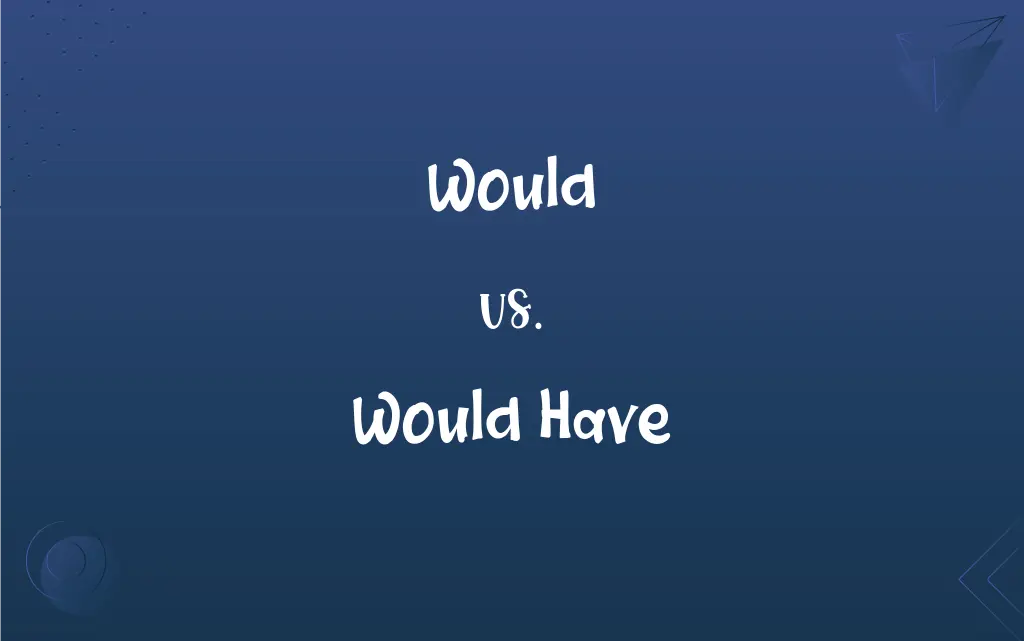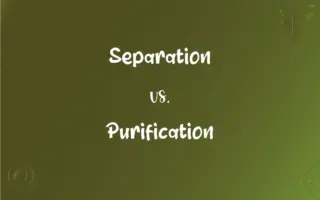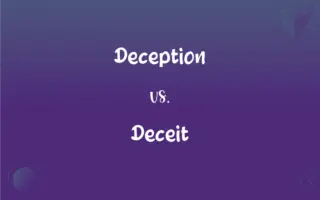Would vs. Would Have: What's the Difference?
Edited by Janet White || By Harlon Moss || Published on December 29, 2023
"Would" expresses a conditional or hypothetical action, while "would have" indicates a hypothetical action in the past that did not actually happen.

Key Differences
"Would" is used to talk about hypothetical situations, often in conditional sentences. It suggests what someone might do or might have done under different circumstances. "Would have," however, is used to speculate about past actions that didn't occur, typically in the third conditional structure, reflecting on how things could have been different.
In expressing wishes or desires, "would" is commonly employed. For example, one might say, "I would travel more if I had more time." This implies a desire to travel, hindered by the lack of time. On the contrary, "would have" is used when reflecting on a missed opportunity or unfulfilled wish in the past, as in, "I would have traveled more if I had had more time," suggesting regret or hindsight.
"Would" also serves to make polite requests or offers, softening the tone of a sentence. An example is, "Would you pass the salt?" Here, "would" is a polite form of asking. In contrast, "would have" is not used in making requests. Instead, it reflects a hypothetical result, as in, "I would have helped you if you had asked," indicating a conditional offer of help that was not realized.
In storytelling, "would" can be used to describe habitual past actions, like in, "When I was a child, I would play outside every day." This implies a repeated action in the past. "Would have," however, does not express habitual actions. It's used for imagining outcomes, as in, "I would have visited you more often if I had lived closer," which speculates on a different past scenario.
"Would" is versatile, also used in indirect speech to report a statement, question, or request. An example is, "She said she would call later." "Would have," in contrast, is not typically used in indirect speech for reporting but for past unreal conditions or speculations, such as, "She said she would have called, but she was too busy."
ADVERTISEMENT
Comparison Chart
Usage Context
Hypothetical actions, polite requests, habitual past actions
Speculation about past actions that didn’t happen
Example Sentence
"I would go to the party if I were invited."
"I would have gone to the party if I had been invited."
Function in Sentences
Expressing conditional scenarios or desires
Reflecting on missed opportunities or different past outcomes
Role in Storytelling
Describing repeated or habitual actions in the past
Imagining alternate past scenarios
Use in Indirect Speech
Reporting statements, questions, or requests
Not typically used for reporting, but for unreal past conditions
ADVERTISEMENT
Would and Would Have Definitions
Would
Used to express a wish or desire.
I would like to order a coffee, please.
Would Have
Indicates a hypothetical action in the past.
I would have gone to the concert, but I was sick.
Would
Indicates a hypothetical or conditional action.
I would travel if I had more time.
Would Have
Expresses regret or missed opportunity.
I would have visited you if I had known you were in town.
Would
Describes habitual actions in the past.
As a child, I would play in the park daily.
Would Have
Implies an unrealized potential action.
She would have been a great teacher.
Would
Employed in indirect speech.
He said he would call me back later.
Would Have
Speculates about alternate past outcomes.
If I had studied harder, I would have passed the exam.
Would
Makes a polite request or offer.
Would you mind closing the window?
Would Have
Used in conditional sentences reflecting on the past.
If it had rained, we would have canceled the picnic.
Would
Past tense of will; usually followed by a bare infinitive.
Would
Used to form the "anterior future", or "future in the past", indicating a futurity relative to a past time.
On my first day at University, I met the woman who would become my wife.
FAQs
Can "would have" change a past event?
No, it's used to speculate about what might have been, not change it.
Can "would" be used for future predictions?
Yes, in a conditional sense, like "I would go if invited."
Is "would" suitable for expressing habits?
Yes, especially for past habits, like "I would often swim."
Is "would have" used in direct speech?
Rarely, it's more common in indirect or speculative contexts.
Can "would" be used without a following verb?
No, it's typically followed by a base form of a verb.
Is "would" always conditional?
Often, but it can also express wishes or habitual past actions.
Can "would have" be used for future conditions?
No, it's exclusively for hypothetical past conditions.
Is "would" appropriate for formal requests?
Yes, it's commonly used to make polite and formal requests.
Does "would have" imply regret?
It can, especially when reflecting on missed opportunities.
Can "would" express refusal?
In some contexts, like "He wouldn't eat his vegetables."
Can "would" be used to express possibility?
Yes, in hypothetical or conditional situations.
Can "would have" imply a different outcome?
Yes, it suggests an alternate outcome in a past scenario
Does "would have" always require a conditional clause?
Often, but it can also stand alone in response to a question.
Is "would" ever used in questions?
Yes, particularly for polite inquiries.
Do "would" and "would have" have the same formality level?
Generally, yes, both are suitable in formal and informal contexts.
Is "would" used in all types of conditional sentences?
It's commonly used in the second and third conditionals.
How does "would" differ in indirect speech?
It's used to report a statement made about the future or hypothetical situations.
Does "would have" need a specific tense in the conditional clause?
Yes, typically the past perfect tense.
Is "would have" appropriate for giving advice?
Not usually, as it deals with past scenarios, not advice.
Can "would have" indicate certainty?
No, it always implies a degree of speculation.
About Author
Written by
Harlon MossHarlon is a seasoned quality moderator and accomplished content writer for Difference Wiki. An alumnus of the prestigious University of California, he earned his degree in Computer Science. Leveraging his academic background, Harlon brings a meticulous and informed perspective to his work, ensuring content accuracy and excellence.
Edited by
Janet WhiteJanet White has been an esteemed writer and blogger for Difference Wiki. Holding a Master's degree in Science and Medical Journalism from the prestigious Boston University, she has consistently demonstrated her expertise and passion for her field. When she's not immersed in her work, Janet relishes her time exercising, delving into a good book, and cherishing moments with friends and family.































































